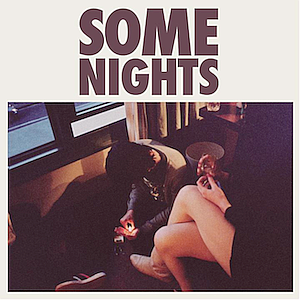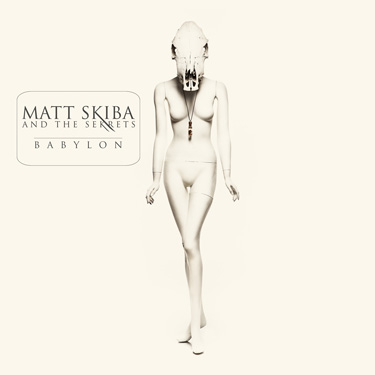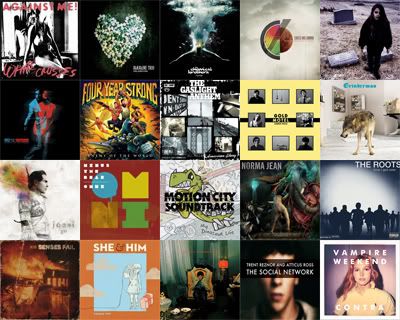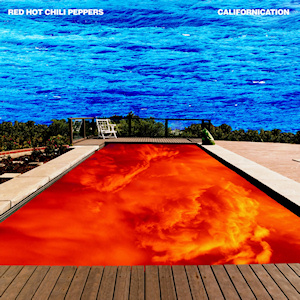
The iconic cover of Weezer’s third self-titled effort, loving dubbed Weezer (The Red Album), perfectly captures the essence of the 10 songs found on the record.
There’s guitarist Brian Bell, sporting jaunt head wear and a scruffy beard for some serious romancin’ at the bars. Next to him is drummer Pat Wilson, opting for a clean-cut sweater and tie that might seem comfortable snuggled in a Ralph Lauren advertisement. Not to be out done is Weezer’s mastermind Rivers Cuomo, clad in a distinguished Stetson and augmented with a moustache that would make even Burt Reynolds blush.
Rounding out the motley crew is bassist Scott Shirner, sporting shades and a serious t-shirt, illustrating his attitude with two simple words.
Death Defyin’.
Why I point this out is because this type of Weezer is a very specific kind of Weezer. This Weezer doesn’t care about re-writing a modern classic like Pinkerton to appeal to Pitchfork Media, or aiming for radio play like on the carefully constructed Weezer (The Green Album). This is a Weezer that’s concerned with creating songs THEY want to play.
And it shows.
The Red Album is like Cuomo & Co.’s answer to The White Album, a completely over-the-top and ridiculous take on what they’ve perfected as well as a synthesis of everything and anything in the musical spectrum. It’s baroque, brave, bombastic, and above all fun. While Make Believe saw the LA four-piece gingerly reaching out towards experimentation, The Red Album seems to be a giant leap forward and ultimate embrace in those ideas.
Nowhere is it more apparent than on the epic “The Greatest Man That Ever Lived (Variations On A Shaker Hymn).” Opening with twinkling pianos and piercing police sirens, “The Greatest Man…” is an expansive multi-movement rock epic that covers everything from thick, melodic glam rock to gorgeous acapella counterpoint. There’s splattering of down and dirty rap with Cuomo busting rhymes like, “I’m like a mage with the magic spell/You come like a dog when I ring yo bell…” while the band channels The Cars in the very next breath, implementing chugging guitars and rising synthesizers to a glorious climax.
“Bohemian Rhapsody,” eat your heart out.
Between the military drum beats and big backing vocals, it’s Weezer at their most symphonic and orchestral, seamlessly weaving dissimilar pop gems together in an incredibly cohesive way. And if there’s ever a constant with Weezer, it’s their ability to really tap into pop brilliance without relying on clichés.
The opening track, “Troublemaker” exemplifies their deft grasp of melody, with Cuomo leading his band through a jangley off-kilter groove. Crunchy riffs and pure rock n’ roll swagger pour from the track, with Cuomo’s call of, “You wanted arts and crafts/How’s THIS for art’s and crafts…” joyously answered by blindingly buzz saw guitars.
Unlike any of the post-Pinkerton material, The Red Album is the only release where the band feels completely confident behind all their instruments. “Pork & Beans” features the fiercest power-pop since “Buddy Holly” with gorgeous backing harmonies that hark back to the band’s original bassist, Matt Sharp. Here, Weezer feels unrestrained and self-confident while still retaining their heavy-handed geekiness that made us fall in love with them to begin with.
Interestingly enough, many of the tracks like “Pork & Beans” recall the thick and fuzzy pseudo-grunge that permeated Weezer (The Blue Album). Yet the band is careful not to strictly rehash the riffs that made them famous. Instead, they opt to work within that frame work and tone, offering the same pummeling energy but with equally awkward lyrics such as, “Timbaland knows the way/To reach the top of the charts/Maybe if I work with him/I can perfect the art…”
Those waiting for Weezer to become Shakespeare, need to get over themselves. Pinkerton wasn’t even THAT sophisticated in its rhyme schemes but it (along with Weezer’s following albums) tapped into an innocence and tenderness that is distinctly charming and moving.
Vocally, everyone stretches their chops on this record, with each member singing lead vocals on at least one track. The stand out has to be Shriner’s “Cold Dark World” where his gravely voice adds just the amount of edge to the snythy, bass driven song.
Elsewhere, the rap-rock extravaganza “Everybody Get Dangerous” is uproariously enjoyable and bears Cuomo’s penchant for memorable sing-a-longs. From the dirty and angular guitar work, to the record scratches and Wilson’s beefy beats, the track seems to plateau over Cuomo’s climbing falsetto. The song recalls Rick Rubin’s work on Licensed To Ill, with driving jams that act as a dynamic method to deliver silky smooth rhymes as well as the boisterous shout-out of, “Everybody get dangerous!/Everybody get dangerous!”
Plus any band to add, “Booya!” for backing vocals is either crazy or brilliant.
Maybe both.
But ultimately, The Red Album succeeds because Weezer has such a strong knack for crafting concise power-pop. “Dreamin’” is easily the album’s opus from its thick rolling riffs to the 50s-inspired hook. And just when listeners think they know what to expect, the band drops out in favor fluid guitar picking, with birds chirping in the background alongside sugary vocal harmonies. The track ascends as the drums pick up steam, finally exploding into a chunky groove set under Cuomo’s velvety vocal delivery.
In the end, The Red Album is a testament to great song writers, even if it’s completely over-the-top ridiculous. It shows how to take the outlandish, the spectacular, and the grandiose, to favor smaller arrangements and make them into a hell of a good time.
And with all that said, here’s to hoping for another Weezer (The _____ Album).
Sounds Like: The Cars (The Cars), A Night At The Opera (Queen), The Blue Album (Weezer)
Key Cuts: The Greatest Man That Ever Lived (Variations On A Shaker Hymn), Everybody Get Dangerous, Dreamin’
 blink-182: Neighborhoods (****½): It may not be Tom, Mark, and Travis’ finest hour, but it’s certainly an exciting homecoming. Picking up where their 2003 untitled record left off, Neighborhoods is the sound of three strong men letting their musical chemistry take them down some interesting avenues. The good news? It’s 100% a blink-182 record rather than an AVA or a +44 album. “Up All Night” soars with spazzy phasers and call-and-response vocals while the crashing pop-punk juggernauts of “Hearts All Gone” and “Natives” call to mind blink’s early roots. Though less spacious than their previous efforts, blink-182 has really explored groove this time around (The stompy, Cure-flavored “Snake Charmer”) while coloring their instantly recognizable hooks with some driving melodies and ringing snyths (“Ghost On The Dance Floor”). The deluxe edition is well worth the purchase, but the big draw here is how effortless it sounds for these men to play together again. It’s been a long 8 years, welcome back blink.
blink-182: Neighborhoods (****½): It may not be Tom, Mark, and Travis’ finest hour, but it’s certainly an exciting homecoming. Picking up where their 2003 untitled record left off, Neighborhoods is the sound of three strong men letting their musical chemistry take them down some interesting avenues. The good news? It’s 100% a blink-182 record rather than an AVA or a +44 album. “Up All Night” soars with spazzy phasers and call-and-response vocals while the crashing pop-punk juggernauts of “Hearts All Gone” and “Natives” call to mind blink’s early roots. Though less spacious than their previous efforts, blink-182 has really explored groove this time around (The stompy, Cure-flavored “Snake Charmer”) while coloring their instantly recognizable hooks with some driving melodies and ringing snyths (“Ghost On The Dance Floor”). The deluxe edition is well worth the purchase, but the big draw here is how effortless it sounds for these men to play together again. It’s been a long 8 years, welcome back blink.








































